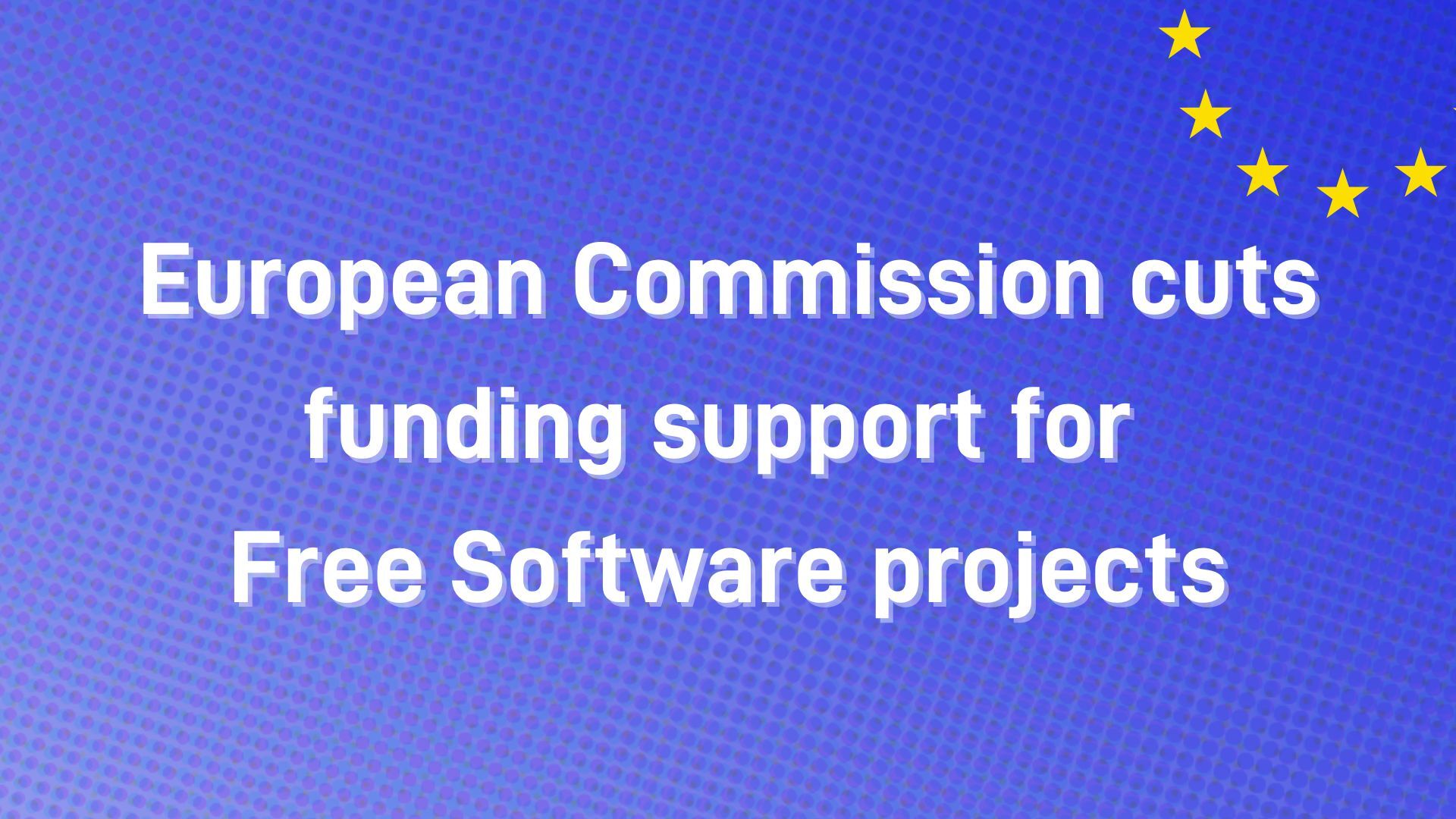Also
The reasons for this shift in budget away from funding Free Software and the NGI initiative seems to be an allocation of more funds for AI, leaving internet infrastructure by the wayside.
Good old AI bubble strikes again.
It’s a justification, they know full well it’s not some future revolution.
But it’s a very good device to hijack discourse and funds.
It seems obvious that people who get to the top are smart, just not in the good way. They know the potential of various technologies. If they don’t understand the subjects themselves, they have hundreds of experts willing to lecture them. Even if they pretend to not have understood a word, in fact they do gain knowledge.
Yeah, after what happened to Greece it’s hard to forget how the EU is heavily infiltrated by the vultures of private finance.
Just vultures. It’s pure corruption. People of the kind that already rule Russia.
Any kind of progress, justice, right etc they don’t respect.
Big fish eating smaller fish is one thing they respect, and they also want more privacy while stealing, and the ability to spy after everyone else and coerce courts and institutions.
It’s that simple.
Agreed. We have allowed our democratic system to be quietly stolen from us without even really noticing. I think we either need to properly reclaim it or to start new systems away from it. The Fediverse is a really good example of the latter.
The fediverse exists in the web, while they exist in the reality and command police, people in airports and train stations, military, internet service providers, etc.
That’s why we should follow the example of the French and do a Revolution every now and then!
Revolutions are destructive and have bad potential. But a certain degree of unchecked chaos is useful.
I would argue that the web is part of reality - it’s our main method of communication. It might be small but I think it’s a good example of successful self-organisation away from government/business/finance.
It might be small but I think it’s a good example of successful self-organisation away from government/business/finance.
It’s definitely not small, and backbones and intercontinental cables and such are not self-organization.
Late 90-s and early 00-s web, however were such an example. But they still relied on benevolence of ICQ and AIM owners, OS vendors, organizations making standards.
Hawala awaits :-)
Was ist das?
It’s informal way of transferring the money. You give your money to Hawalardar which contacts the Hawalardar in the destination country. That person gives back the money minus fee which you pointed out or any person who knows the code. It works like money transfer but outside the formal payment system. That’s why it’s hated by most governments in the world. In many countries it has names like in China “flying money”
First time I’ve heard of it. Sounds awesome!
As long as public money -> public code, this could potentially be a net positive for stopping predatory AI practices from Microsoft and buddies. Still, taking away funding from other projects could also be catastrophic for everything else.
If there are any French or Germans in particular reading this please share on your numerous native instances: If you are in the EU you need to contact policy makers (as outlined in the article) about this. I’m sorry I can’t be with you on this one but Brexit.
Removed by mod
Unfortunately your information seems a little outdated. It’s true that Germany did try it for a moment until Microsoft showed up with suitcases of money in the chancellor office so to speak and he announced to essentially move away from open source again.
Though on the federal level, there‘s still some hope. Maybe.
You are talking about Limux which started 2 decades ago, but there are other initiatives to enforce oss software in german government.
And also the same who wrote the bundes trojaner :-) ( I know it’s most likely the German intelligence but still funny )
They have lots of money for corporate software from Microsoft though.
The public to private theft is infinite
The money is needed for funding the police to implement chat control’s and going dark’s enforcement.
Even sadder:
The reasons for this shift in budget away from funding Free Software and the NGI initiative seems to be an allocation of more funds for AI, leaving internet infrastructure by the wayside.
Very big brain moment aktschualluy. The AI will start maintaining all the dropped projects! Right?!
Oh, for fucks sake.
Lol, whyyyyyyyYYYYYYYY.
Kill bots
Read about this on the site of the garage project. they apparently wouldn’t be a thing without this funding.
Recently set up a cluster and it’s great. Sad to hear this went through
Well, they still can’t underfund gnu privacy guard :-) It’s pretty much already finished product and working pretty well.
Eh? I tried it about a year ago, and I found all the same clunky problems that were there 20 years ago.
clunky
Thunderbird + kleopatra? K-9 + OpenKeyChain ( android )? Where did you have issues?
I went through an exercise with a few other developers to see if we could use it for transferring sensitive information. I was using Windows w/WSL2 at the time (now I’m full Linux for my work machine), and I believe the other two were on Macs.
Our conclusions were that while it might be useful alongside other ways, it was too clunky to use in general. One of the more useful things we could do is have developers sign git commits.
The email plugins for various clients make it easy to mistakenly think you’re sending an encrypted email. When even technical people are making this mistake, then it’s a big issue for widespread adoption. The plugins also don’t always send it in a format that works for every client out there. We found the most consistent way was to encrypt the message in a file and attach it to the email.
The plugins don’t work with modern webmail, anyway.
Public key servers are unreliable. They’re largely maintained by volunteers, so this is understandable, but we couldn’t recommend that the company use them. If we wanted reliability, we’d need to run our own internal keysever.
Then there’s the key signing meetings we’d need to have. Even technical people find these a bother. These are, unfortunately, inherent to the web of trust model.
I really wanted to make it work. The decentralized nature of the web of trust–as opposed to the hierarchical model of TLS–is appealing to me personally. But this shit hasn’t gotten better in 20 years, and at least some of it is unfixable.
The email plugins for various clients make it easy to mistakenly think you’re sending an encrypted email.
Ok. Now I know what’s the issue but this is not the problem with gpg. Nah, gpg integration with thunderbird is so flawless that it clearly says when it’s encrypting when not. Also you can see the raw email content and then you see whether it’s plaintext or ciphertext. I’m using thunderbird with gpg very often so I know how it works nicely with gpg
It’s a problem with the gpg ecosystem. No matter what code is actually responsible, it prevents us from using it in practice. We’re not going to switch our whole email system and clients just for this.
We implemented this at work using Hashicorp Vault for PKIs and a dovecote smtp server to pass IMAP from whatever client our endusers were using. The only problem was clients using the O365 webportal in unsupported or outdated browsers, but we took care of that with SCCM.
https://developer.hashicorp.com/vault/tutorials/secrets-management/pki-engine
https://doc.dovecot.org/configuration_manual/mail_crypt_plugin/
https://doc.dovecot.org/configuration_manual/forwarding_parameters/
Damn, rare technology L from the EU. Hopefully they walk back this decision.
Not rare, they’ve been trying to block encryption for a while unfortunately
Ouf, that’s a rough blow!
Yea. One of my project is funded through ngi currently 😭
I shudder to think what this will do for the development of kbin! Oh wait.
Did you just apply for it?
No we’re already accepted, but I would have liked to renew it eventually.
No I meant, what was the grant process? As in, just applying for it, or selected for it?
Yes you have to apply for it and it’s a long process afterwards with multiple stages. Go check https://nlnet.nl and they explain it.
Weren’t there recently EU calls for using open source software in government applications due to concerns about proprietary software like Windows in the wake of gestures generally at Windows?
Yes, there are calls to move towards OOS, but as I assume that is it. Only calls. I remember cities moving onto open source and than thanks for lobbyists moving back to proprietary software again.
I remember cities moving onto open source and than thanks for lobbyists moving back to proprietary software again.
What you remember is the news cycle covering the City of Munich switching from Windows to Linux, then another news cycle about how they’re moving back to Windows.
What didn’t get much coverage though, is that Microsoft did a (suspected under-table) deal with the outgoing government to switch back to Windows if Microsoft built an office in Munich.
What then happened is the new government came in, looked at the situation, and cancelled it (although MS may have built that office always). Right now Munich is still using Linux and still actively rolling it out.
That’s stupid.
Removed by mod
I did my part 😇
Is it as vague as “funds for AI” or cloud computing capacity to keep up with China and the US? Because we could use that in the EU. But who would be operating it, Universities? MIC?
The state won’t save you.
And private enterprise is even less likely to look out for you…
Then what good is a state for? Let’s get down to anarchism once and for all!
deleted by creator










